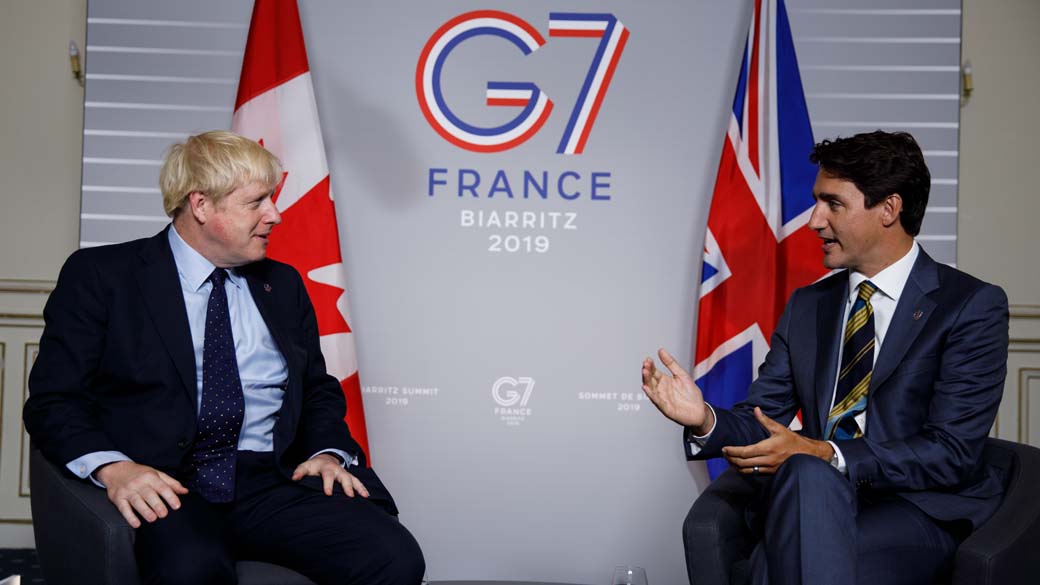UK must lower expectations in post-Brexit negotiations with Canada: trade experts
iPolitics | 8 September 2020
UK must lower expectations in post-Brexit negotiations with Canada: trade experts
By Rachel Emmanuel
Existing trade standards with Britain will continue once the Canada-U.K. agreement expires at the end of the year, but the U.K. will need to lower its expectations for a future deal with Canada, say trade experts.
The U.K. is Canada’s biggest European trading partner. Since Brexit, the two countries have been operating under the terms of Canada’s Comprehensive Economic and Trade Agreement (CETA) with the European Union, but the provisions will formally end by January of next year. Since leaving the EU, British negotiators have been seeking a more expansive deal with Canada that would include access to Canada’s dairy market — something experts say is unlikely to happen.
Peter Clark, president of Grey, Clark, Shih and Associates, Ltd., which provides counsel on international trade, said the U.K. wants an agreement like CETA or better, but it needs to understand it has less to offer since leaving the European Union.
“I think that their expectations are very high,” Clark said. “They may have to water them down if they hope to get deals.”
The government of British Prime Minister Boris Johnson has been a strong advocate for free trade; in fact, it has expressed a desire for free trade with the countries that make up 80 per cent of its trade in just over two years.
But a challenge for Britain, said Clark, is that the countries with which it negotiates trade agreements need to consider how the EU will react: The collective will want to remind countries interested in leaving that there’s a price to pay. He said Canada must ensure the U.K. pays for what it gets.
“The Europeans will be watching very closely,” he said, adding that Europe won’t be conceding any dairy quota to the U.K., which would like its dairy products to be sold in Canadian markets. “Certainly, suggestions from Canada that the EU should reduce anything it has to give to the U.K. are going to be met with resistance and rejection.”
Canada conceded only a share of its domestic dairy market for a range of dairy products in the Comprehensive and Progressive Agreement for Trans-Pacific Partnership (CPTPP) — whose 11 signatories do not include the United States or Britain — while the U.S. won a new Canadian market share for its dairy exports in the Canada-United States-Mexico Agreement (CUSMA), which took effect in July of this year.
Eric Miller, president of the Rideau Potomac Strategy Group, said Canada must be careful: Because of favoured-nation clauses in CETA, any concessions Canada makes for favour from the U.K. are automatically granted to the EU, without gaining anything from the Europeans.
Miller agreed it’s unlikely Canada will concede any dairy quota to Britain, since it risks irritating the dairy sector and subjecting itself to compensation through subsidies if it starts meddling with the supply-management system by opening imports. He also said the U.K. wants access to Canada’s financial-services sector, allowing European insurers to set up shop in Canadian cities. Ottawa has resisted this too, he said.
Ryan Nearing, press secretary for International Trade Minister Mary Ng, said any future trade agreement between Canada and the U.K. will be influenced by the latter’s trade relationship with the EU, as well as any unilateral approaches by Britain.
“We will continue to work with both the U.K. and EU to maintain strong and stable trading relationships that grow our economies and benefit our people,” he said in an emailed statement to iPolitics.
As the negotiations play out, Miller said Canada has the advantage, because its trade negotiators are at “the top of their game,” given the recent years they’ve spent negotiating CUSMA, CETA, and the CPTPP.
In contrast, he said the U.K. is just learning to negotiate a modern trade agreement. Miller said it’s been hiring foreigners for trade negotiations, as well as Ottawa-based trainers to aid their negotiators. The U.K., he said, is now realizing that getting free trade with the world isn’t easy.
“They’re having to reconcile themselves, I think, to the gap between expectations and reality,” he said. “They have no choice now but to figure out how to make it work.”
In a June news release, the British High Commission in Ottawa expressed an interest in joining the CPTPP, something both Clark and Miller say is unlikely to happen anytime soon.
Miller said other countries like Taiwan have been more aggressive in positioning themselves as potential CPTPP candidates, and a renegotiation of the trade deal would need compliance from all 11 signatories, including Canada.
“Nobody is too keen to open the CPTPP,” Clark said. “Everybody may want to negotiate parts of it, and if you get into that, it could unravel.”
Furthermore, he said negotiations are neither easy nor quick when you’re not conducting them face-to-face.
In the end, the ambitious agreement Britain wants in place before next year is “very, very wishful thinking,” Clark said.






